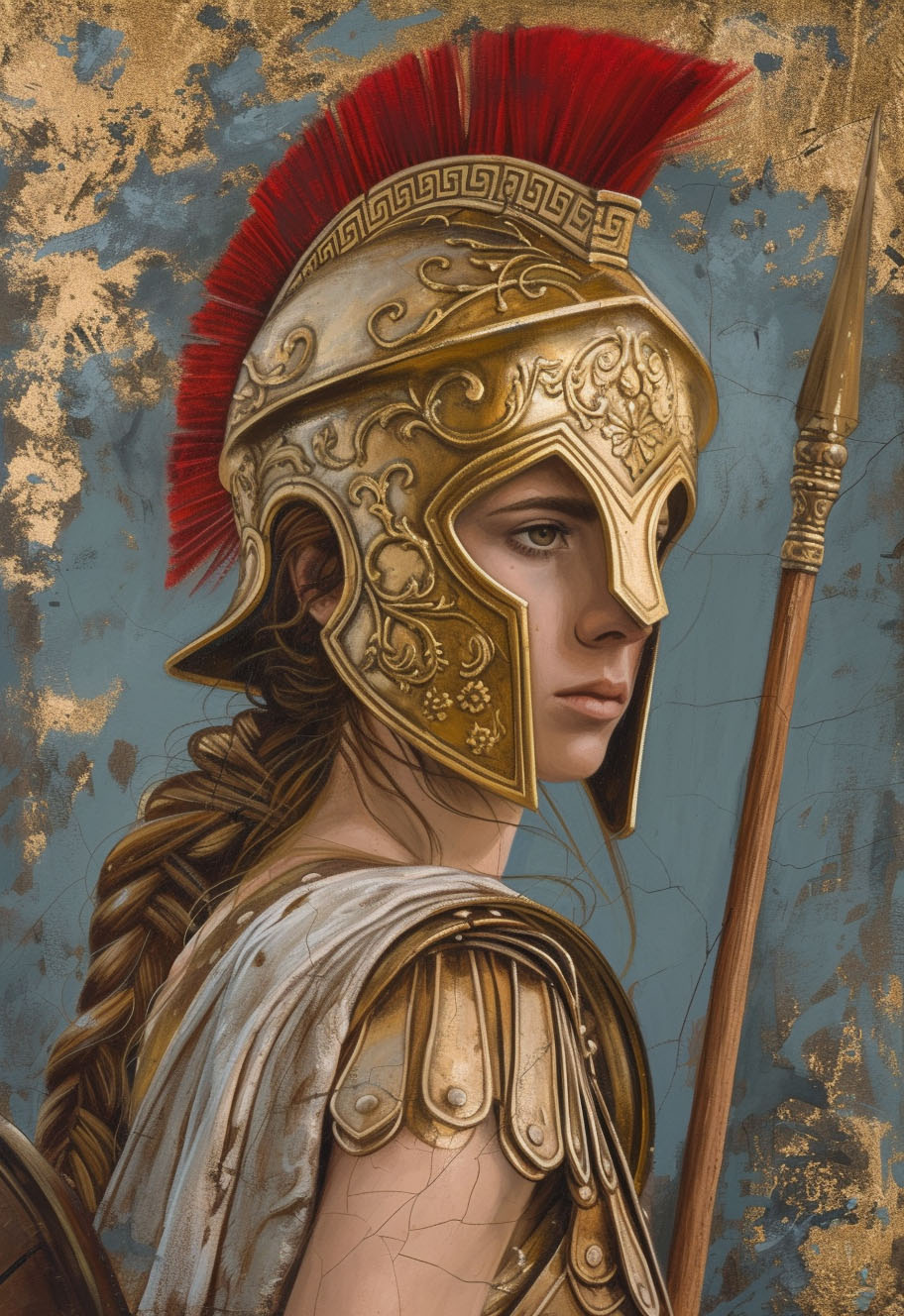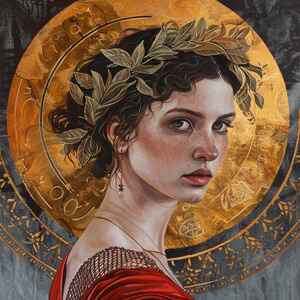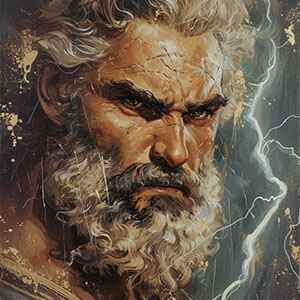Athena
In Greek mythology, Athena is one of the twelve Olympian deities and is widely regarded as the goddess of wisdom, warfare, strategy, and handicrafts. She is a daughter of Zeus and Metis, who was swallowed by Zeus while pregnant with Athena, leading to her birth from Zeus's head. Here are key aspects of Athena in Greek mythology:
Parents: Zeus & Metis
Siblings: NA
Consort: NA
Children: NA

Parthenon and Virgin Goddess: Athena is often referred to as Athena Parthenos, emphasising her virgin status. The Parthenon, a temple dedicated to Athena in Athens, symbolises her virginity and is a significant cultural and architectural landmark.
Parentage: Athena's unique birth is a result of Zeus swallowing her mother, Metis, after a prophecy warned that Metis would bear a child more powerful than Zeus himself. Athena emerged fully grown and armoured from Zeus's forehead.
Attributes and Symbols: Athena is commonly depicted with a helmet, shield, and spear, emphasising her association with warfare. The owl, particularly the little owl, is a sacred bird to Athena and symbolises wisdom. The olive tree is another important symbol, representing peace and prosperity.
Goddess of Wisdom: Athena is revered as the goddess of wisdom, intelligence, and strategic warfare. Her wisdom is often contrasted with the more impulsive and chaotic nature of Ares, the god of war.
Protector of Athens: Athena is the patron goddess of the city of Athens. According to myth, she won a contest against Poseidon to become the city's protector by offering the olive tree as a gift to the Athenians. The Parthenon on the Acropolis is dedicated to her.
Aegis and Gorgon's Head: Athena's shield, called the Aegis, often bears the head of the Gorgon Medusa. The Gorgon's head is a symbol of protection, and its gaze is believed to have protective powers.
Craftsmanship: Athena is also associated with craftsmanship and is said to have taught humans various skills, including weaving and pottery. The creation of the first flute is also attributed to her.
Role in the Iliad: Athena is a prominent figure in Homer's "Iliad," where she supports the Greeks, particularly the hero Odysseus, during the Trojan War. She is known for her strategic counsel and assistance in battle.
Myth of Arachne: In the myth of Arachne, Athena competes with a mortal weaver named Arachne. When Arachne's skills surpass even those of the goddess, Athena transforms her into a spider as punishment.
Cultural Impact: Athena's influence extends beyond mythology and into the cultural and artistic heritage of ancient Greece. She is a symbol of wisdom, civilisation, and strategic prowess.
Roman Equivalent: In Roman mythology, Athena is identified with Minerva, the goddess of wisdom and strategic warfare.
Athena's multifaceted nature as a goddess of wisdom, warfare, and craftsmanship reflects the complex values of ancient Greek society. She is celebrated for her intelligence, strategic acumen, and contributions to the betterment of humanity.
Immediate Family

Metis
Quick Facts
- Born fully grown and armored from Zeus's forehead.
- Revered as the goddess of wisdom, intelligence, and strategic warfare.
- Patron goddess of Athens, with the Parthenon dedicated to her.
- Associated with the owl, olive tree, and Aegis (shield with Gorgon's head).
- Competed with Arachne in a weaving contest and transformed her into a spider.
- Cultural impact extends to the artistic heritage of ancient Greece.
Further Reading
Art &
Architecture
Ancient Greek art and architecture, with its harmonious proportions and timeless elegance, continue to inspire awe and admiration millennia later.
Discover
Greek Mythology & Mythical Characters
Greek mythology, a rich tapestry of gods, heroes, and mythical creatures, captivates the imagination with its tales of love, betrayal, and epic adventures that delve into the depths of the human psyche.
Discover
Ancient Greek History
Ancient Greek history, marked by remarkable achievements in democracy, philosophy, and warfare, shaped the foundation of Western civilization, leaving an indelible legacy of innovation and cultural influence that continues to resonate to this day.
Discover
Ancient Greek Olympics
The ancient Greek Olympics, held in Olympia every four years, celebrated athleticism, unity, and cultural pride, serving as a testament to the enduring spirit of competition and excellence that transcends time and borders.
Discover
Ancient Greek Wars
Ancient Greek wars, such as the Persian Wars and the Peloponnesian War, were pivotal conflicts that shaped the course of history, highlighting the struggle for power, independence, and the clash of civilizations in the ancient Mediterranean world.
Discover
Ancient Greek Culture and Society
Ancient Greek culture and society, characterized by its emphasis on art, philosophy, and civic engagement, fostered a vibrant intellectual and social landscape where innovation flourished, democracy thrived, and the pursuit of knowledge and excellence was celebrated as fundamental values of civilized life.
Discover
